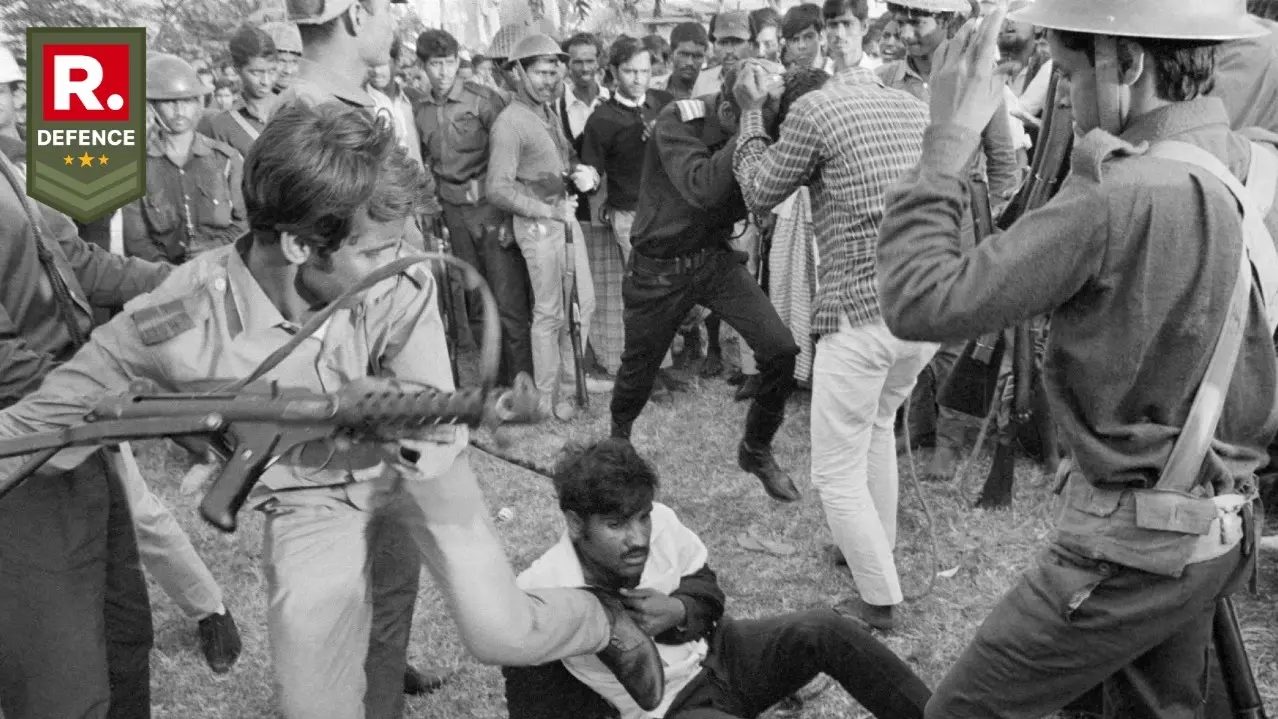Updated 17 April 2025 at 14:44 IST
‘Never Again’ Forgotten? Dhaka-Pakistan Talks Erode Spirit of Bangladesh’s Liberation War
In a move triggering sharp domestic criticism, Bangladesh has hosted Pakistan’s Foreign Secretary Amina Baloch for the first FOC in Dhaka since 2010.
- Defence News
- 4 min read

New Delhi, India - In a move drawing fierce domestic criticism and raising eyebrows across South Asia, the Yunus-backed Bangladeshi regime has welcomed Pakistan’s Foreign Secretary Amina Baloch to Dhaka for the first Foreign Office Consultation (FOC) since 2010. The development comes amid an increasingly controversial shift in Dhaka’s foreign policy posture—one that appears to have all but erased the scars of the 1971 Liberation War from the nation’s diplomatic memory.
As Baloch touched down at Hazrat Shahjalal International Airport earlier today, state media highlighted the visit as “historic,” with expectations of enhancing bilateral trade, defence cooperation, and regional synergy. But for many in Bangladesh’s civil society, the pomp surrounding the FOC has evoked memories of mass rape, genocide, and cultural obliteration—atrocities widely attributed to the Pakistani Army during the 1971 war.
Critics have accused Prime Minister Mohammad Yunus’s administration of sidelining national sentiment in pursuit of short-term strategic alignment. “Bangladesh was born from the ashes of resistance against Pakistan's brutality,” said Nasiruddin Ahmed, a freedom fighter and former lawmaker. “Today’s government has chosen to walk hand-in-hand with the very perpetrators of our collective trauma.”
Legacy of 1971 Ignored Amid Trade and Talks
Under the current administration, Bangladesh has reinitiated direct trade with Pakistan, notably importing 50,000 tonnes of rice earlier this year. More agreements are in the pipeline, including a direct shipping line and flight operations between Dhaka and Karachi. This rapid thaw in relations has triggered debates on whether economic pragmatism is overtaking the ideological core of Bangladesh’s sovereignty.
Advertisement

Further fanning the flames is the regime’s silence on critical issues such as the pending apology from Pakistan over the 1971 war crimes, and the unresolved plight of the 'stranded Pakistanis'—Bihari Muslims still living in limbo within Bangladeshi camps. Government representatives have conspicuously avoided these topics in press briefings, suggesting a tacit policy of diplomatic amnesia.
A Political Pivot or Historical Betrayal?
Many see this rapprochement as being engineered by a political elite aligned with globalist interests, who seek to position Bangladesh as a neutral bridge between South Asian powers. However, opposition parties argue it is nothing short of betrayal. The Jatiya Mukti Dal, a nationalist outfit, held a protest march in Dhaka this evening, denouncing the FOC as “a stain on the blood of martyrs.”
Advertisement
“The Yunus regime is whitewashing history,” said party spokesperson Khaleda Rahman. “Our mothers were violated, our intellectuals executed, and our culture erased under the Pakistan Army. And now we’re offering them trade pacts and defence dialogues?”
Regional Reactions and Strategic Risks
India, which had militarily intervened in 1971 to aid Bangladesh’s liberation, remains watchful. The recent defence and intelligence exchanges between Dhaka and Islamabad—most notably the ISI visit led by Maj Gen Shahid Amir Afsar in January—have set alarm bells ringing in New Delhi. Indian military posture has been stiffened in the Siliguri Corridor, with counter-intelligence operations stepped up in eastern sectors.
Strategists warn that while diplomatic realignments are a sovereign right, historical memory must remain non-negotiable. “Bangladesh must ask itself: at what cost does it seek strategic balance?” said Lt Gen (Retd) S. P. Dutta, an Indian defence analyst. “Burying the past without justice only fertilizes the soil for future discord.”

As Foreign Secretary Baloch and her Bangladeshi counterpart Md Jashim Uddin prepare for formal talks tomorrow, the streets of Dhaka simmer with discontent. Social media platforms are ablaze with calls to remember 1971—not just in textbooks, but in policy. For a country forged in blood and born of resistance, Bangladesh today faces a dilemma: should national memory be wielded as a sword or buried for the sake of diplomacy? The answer, many fear, is already being written behind closed doors.
Watch- Pakistan Army Chief Asim Munir Spews Hatred Against Hindus, Brings Up Two Nation Theory
Published By : Yuvraj Tyagi
Published On: 17 April 2025 at 14:44 IST
